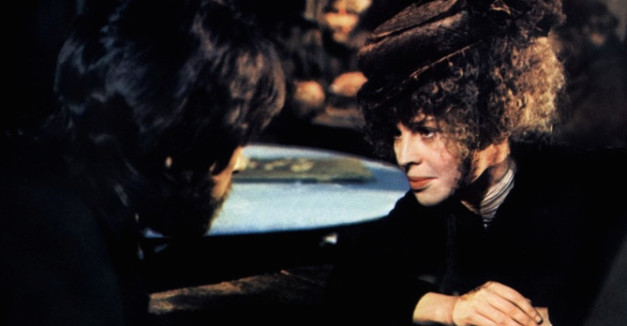[Editor’s Note: McCabe & Mrs. Miller screens at Film Streams, 1340 Mike Fahey St, on May 9th, 10th and 12th. Visit filmstreams.org for tickets and showtimes. Justin Senkbile is a writer and filmmaker living in Omaha. Reach him at jmsenkbile@gmail.com.]
* * *
Sure, Robert Altman’s McCabe & Mrs. Miller is a gloomy western from 1971, set during a dim and desolate chapter of the early 20th century. But somehow, the thing still feels radically ahead of its time. In fact, in terms of all the heavy lifting it leaves to ephemeral ingredients like sound, mood and atmosphere, it seems to remain several steps ahead of us even now.
To the hypnotic strumming of Leonard Cohen’s “Stranger Song”, our tinhorn gambler (Warren Beatty as John McCabe) rides into a mud-and-sticks town called Presbyterian Church carrying his obscure past and a dream of building a full-service frontier pleasure palace. He easily seduces the town’s drunk and desolate miners with the idea, but finds himself less irresistible to a prostitute from the city named Mrs. Miller (Julie Christie). She arrives with her own clouded past and problems (or habits, namely opium), and balks at having to push, prod and eventually bully McCabe into what appears to be a perfectly logical partnership proposal: once his new saloon is built, McCabe will handle the gambling while she takes care of the brothel.
And so the dynamic between them is set: Miller, humane but cold, and fixated only on dollars, versus McCabe, whose pride always trumps and undoes his undeniable vision and resolve. Most crushing for him, his hubris gets all mixed up with a deepening affection for Miller, who holds him disdainfully at a distance – unless, of course, he’s willing to pay for her attention, like anyone else. McCabe’s clumsy longing ferments into a sloppy drunk’s brand of pomposity, which gets him in trouble when dealmakers from a major mining corporation arrive and try to buy him out.
With its hues of loss, isolation and incommunicable love, McCabe & Mrs. Miller actually feels quite a lot like a Leonard Cohen song. A small handful of his songs, and arrangements of them, recur throughout, all of them from his 1967 debut, “Songs of Leonard Cohen” (Altman’s love for that album, and Cohen’s enthusiasm for the director’s 1970 film Brewster McCloud is part of what brought them together here). Cohen’s sinewy, mournful voice is one of the biggest aural elements here, and it imbues many of cinematographer Vilmos Zsigmond’s hazy brown images with a visceral third dimension.
Sonically, aside from Cohen, the film is made up of little more than various combinations of howling wind, boots crunching on snow and a smattering of often whispered or mumbled voices. But it’s the effect of those combinations of natural sounds that give McCabe its rich texture and that helped cement Altman’s status as one of the true innovators in movie sound.
Despite being the next out of the gate after his hugely successful war comedy M*A*S*H, McCabe didn’t make much of a dent commercially. But it remains an essential if under seen movie, one of the richest and most haunting of its decade, and of its director’s career.




